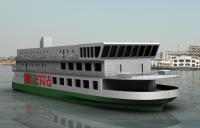
Winning design from University of British Columbia
In June, we posted about the Safe Affordable Ferry Design Competition, sponsored by the World Ferry Safety Association, in which student teams from six maritime universities competed to develop a ferry design for a 500 passenger ferry for Bangladesh. Recently the competition winners were announced. The awards will be presented at the Annual Meeting of Interferry, in Malta, on October 7.
A top prize of $5000 is to been awarded to the student team from the University of British Columbia, Canada. The team designed a monohull vessel that had exceptional stability characteristics. The entry was very complete in terms of design features and cost and fuel analysis. Features include CNG fueled engines, modular cabins, and handicapped access.
The second prize of $3000 is to be awarded to a team from Tolani Maritime Institute, Pune, India, and two third prizes of $1000 each will be awarded to teams from Istanbul Technical University, Istanbul, Turkey and University of Applied Sciences, Bremen, Germany.
Tolani Maritime Institute team also designed a monohull vessel that was extremely stable with good under-keel clearance, made allowances for upstream and shallow water effects, with redundancy built in with twin screws and diesel engines.
Istanbul Technical University students’ submission had good overall design appropriate to the route characteristics and was clearly designed for the comfort of passengers and tourists. The University of Applied Sciences of Bremen students designed a vessel that was stable, with double sides and double bottoms, with redundancy in engine rooms and twin screws, and with bow thrusters for docking.
“The remaining entrants all had commendable designs, which we hope they too will carry forward,” said Dr. Roberta Weisbrod. Webb Institute’s team designed a stable functional vessel with bow thrusters and containing an emergency generator. The vessel had an innovative feature that could be applicable in other services – like the extra leaves for a table they invented a design that could extend the capacity upon demand. The National Technical University of Athens students designed a vessel that had good esthetics, many amenities for the customers, good structural design and a 360-wheelhouse view. The students from the Maine Maritime Academy presented an intriguing design based on a trimaran hull used for fishing fleets; unfortunately the necessity of students having to go to sea prevented them from completing the analysis.
The Worldwide Ferry Safety Association is a 501 (c) 3 non-profit organization dedicated to improving ferry safety in developing nations by improving vessel design and crew training. The WFSA was formed to supplement the Ferry Safety Project led by Interferry and the International Maritime Organization.
